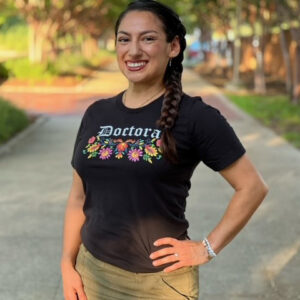Illuminating Humanities: Denise Meda-Lambru

Denise Meda-Lambru, 2021-2022 Glasscock Graduate Research Fellow and 2023-24 Glasscock Graduate Residential Fellow, Department of Philosophy, Texas A&M
The Glasscock Center is excited to continue this series that highlights humanities research at Texas A&M, as well as the vital role played by the humanities beyond the academy.
For this highlight, we invite PhD Candidate, Denise Meda-Lambru, to tell us about her experiences as a Graduate Research Fellow (2021-2022) and a Graduate Residential Fellow (2023-2024) supported by the Glasscock Center.
Denise Meda-Lambru is a doctoral candidate in the Philosophy Department at Texas A&M University. Her dissertation, “A Chicanx Investigation of the Aesthetic and Ethical Commitments to Re-Member our Dead,” explores how communities who respond to multiple oppressions articulate death. She weaves together Latinx, Chicanx, and Indigenous philosophical lenses and blends disciplines such as anthropology, history, and religious studies to offer alternative frameworks for understanding death that are not incorporated in traditional Western philosophical framing. Meda-Lambru’s most recent publication, “A Unique Response to Death: Day of the Dead Fiestas and Communal Articulations of Resistance,” expands on how philosophical approaches to Chicanx views of death are conceptualized and contextualized to show how Mexican rituals of death embolden resistance to social oppressions and cultivate interconnected relationships within communities.
The Glasscock Graduate Research Fellowship program provides support to graduate students working on the master’s thesis or doctoral dissertation, including funding for fieldwork, travel to archives, and purchase of research materials. With the Graduate Research Fellowship, Meda-Lambru traveled to Los Angeles to conduct interviews with altar makers and attend Day of the Dead events, which proved key in developing evidence for her doctoral dissertation. Meda-Lambru’s most recent award, the Glasscock Center’s Graduate Residential Fellowship, gave her semester-long support to complete her doctoral dissertation.
“The [Graduate Residential] fellowship ensures you’re provided the funding to develop your research without having to spread yourself out so thin,” Meda-Lambru explains. “Had I not received the fellowship, I would have been teaching two classes…[while] still doing job market related things and trying to finish my dissertation.”
Meda-Lambru emphasizes that having an office in the Glasscock Center during her fellowship provided her a physical space to focus on her work, as well as surrounding her with a supportive community. “Everyone was really welcoming and very supportive and just that type of support in that entire space was really good for me to kind of just refresh and finish the way I needed to,” Meda-Lambru says. She also noted the importance of her Glasscock Center office-mate Valentina Aduen, a PhD Candidate in Communication & Journalism who was also a Graduate Residential Fellow.
“I really appreciate the coupling of the fellows [as office-mates] because doing a dissertation tends to be very lonesome; having a ‘partner-in-working’ where we were both just figuring it out, pushing through and trying to get [the dissertation] done together really helps build morale,” Meda-Lambru says. “Sharing an office with Valentina was one of the greatest blessings I had in the Glasscock Center.”
As part of her Graduate Residential Fellowship, Meda-Lambru presented a chapter of her dissertation, “Reciprocal Sustenance and Altar Spaces: An Ethical Grounding for Invoking Death,” at a Glasscock Center Colloquium. In colloquia, presenters discuss their works-in-progress with scholars from a variety of disciplines.
“[The colloquium] was my first time presenting on materials from Chapter 5 of my dissertation, and being able to have a dialoguing experience with this work was really helpful,” Meda-Lambru says. “My work is interdisciplinary, so it provided me with a venue where I could present my work and engage with an audience full of members that also do work with interdisciplinary veins.”
Meda-Lambru’s project is one of the first accounts of Day of the Dead commemorations within the Chicanx community in the United States. Specifically, she investigates how interconnected relationships with the dead are created within Chicanx communities and how resistance to systems of power—such as race, gender, and class—are informed by communal practices of death. Her research on Day of the Dead commemorations, primarily altars, provides insight into these complex social dimensions through examining both the embodied and concrete activities of marginalized communities and the spaces created for/by these practices.
“Day of the Dead commemorations are community-based types of celebrations or events that are meant to support a relationship between the living and the dead, which is to say, the dead themselves are a part of the community,” Meda-Lambru says. “How we treat our dead, what we do for our dead, and why we do what we do for the dead offers insights that have been historically, and specifically for the Chicanx commemorations of the dead, overlooked and socially neglected.”
Meda-Lambru feels that her research on altar-making is an apt analogy for her own personal goals with this project and as a scholar. Importantly, she is creating resources and citations for this rich philosophy that exists outside of the Western theoretical gaze that other scholars can build upon.
“The altar maker is creating a space for some sort of community and building with those that the altar is envisioned for which really challenges me to envision this project as something that is also beyond me” she says. “I offer citations and resources that create space for curiosities to grow—it’s not a project that can continue without being rooted in community.”
This fall, Meda-Lambru joins the Philosophy & Religion Department at University of North Texas. She anticipates turning her dissertation into a book and plans to expand her research into different geographical locations.
